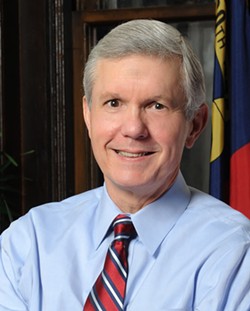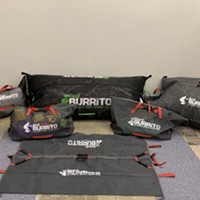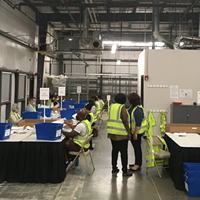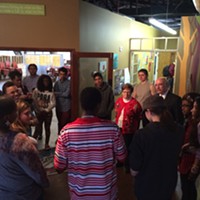This is the second installment of a three-part series of interviews with the Democratic candidates for governor of North Carolina.
After Gov. Beverly Perdue announced that she would not seek a second term, Democrats have been scrambling to put together statewide campaigns that can win their primary and compete against Pat McCrory, the likely Republican candidate.
The three main Democratic candidates are Lt. Gov. Walter Dalton, former Congressman Bob Etheridge and state Rep. Bill Faison. In this installment we speak with Dalton, a former six-term state senator from Rutherfordton who entered the race with the most money and endorsements but with questions about whether he had the energy or the political skills to win.
So far Dalton has come out swinging, waging a populist campaign with a hopeful message. If he can keep it up, Dalton has the potential to move past the small-ball debates of recent years to a daring new era for North Carolina politics.
Creative Loafing: Did Gov. Perdue's decision to not run again catch you completely off guard?
Dalton: Yes, I had a fundraiser the night before for my reelection campaign for lieutenant governor and was satisfied that we had had a good fundraiser. And then the next morning I heard a rumor that she may not run, and then at 10:45 a.m. she called and told me that she was not going to run. So, I needed my morning coffee that day.
CL: Your recent ad Restless Energy is one of the best videos we've seen in North Carolina politics in quite some time. What's the message behind it, and what's your vision for North Carolina?
Dalton: The video is about North Carolina having a restless energy. We've never been satisfied with the status quo. If you look at North Carolina's history, we've been a state of big ideas, being the first public-university system in the nation to give people that opportunity. We were the state that said if you have the ability and desire, then you should have the opportunity to improve yourself. We had the vision for Research Triangle Park, marrying education, research and business. And we've created one of the best community-college systems in the nation because we believe in opportunity for people. The purpose of the video was to say that North Carolina needs to continue to be a state of big ideas, to be a state that is progressive, to be a state that provides opportunity for people. That is the way you grow a new economy. That is the way you energize our people. What we've seen going on is that undue cuts to education, undue cuts to healthcare and trying to freeze economic-development money were not good for North Carolina's current economy nor for its future economy. Those things are investments in our future.
CL: Your father was a state senator, holding the seat that you eventually won yourself, but he died when you were very young. Was he a reason that you got into public service?
Dalton: Yes, that's true. He died when I was 8 years old, and I didn't fully understand what it meant to serve in the North Carolina senate. But I know we always had a picture, the senate picture, hanging in the house. And we were always very proud of that. When I got out of law school and came back to the community, I never will forget someone coming up to me and saying, "I'll never forget your father for helping us get our roads paved." That would have been back in the early 1950s, so this conversation was a good 30 years later. Yet this individual was saying that what he did had a tremendous impact on them and their quality of life to such a degree that decades later they remembered it, and I thought that showed the power of public service and how you can help people and do things that are good for them. So I always had an interest in it, but my children were young. I had two opportunities to run earlier in life, but because I had lost my father when I was very young I did not want to leave my young family. So I passed on those two opportunities, but in 1996 I did decide to jump into the senate race, and beat and incumbent. The rest was history. I served six terms, twelve years, and I am now a lieutenant governor running for governor.
CL: Many of our citizens are distrustful of what happens in our nation's capital, in Raleigh. Many are disengaged in their own communities. What can we do to bring back civic engagement?
Dalton: You're right, and that's a very regrettable circumstance. All I would say is that they need to realize that their interest in their communities is very critical and vital. I asked someone on a small-business listening tour what I could do to make their small business better, and he turned it around and asked what I could do to make his community stronger. If you don't have a strong community, it doesn't matter if you don't have people buying your services. So investing in community is very critical. People have asked me why I chose public office. It's a tough life. It really is. But I find it very valuable. You're trying to help people, and when someone asks, "Why do you do it?" I say it's for the psychic income, not for the monetary income. You do it to help the people you represent. That's the same in the community. When you get engaged in United Way, or with the Red Cross or become a Cub Scout pack leader, you're making your community stronger. Overall that will make North Carolina stronger.
CL: What does the Democratic Party in North Carolina stand for in the 21st century? What makes you the best person to be its standard bearer?
Dalton: Well, I think the Democratic Party stands for opportunity. We've always been a party that said we want everyone to be the best that you can be. I have always said that I believe in a bubble up economy. It's not competition when one team walks on the field in new uniforms and good coaching, and the other team walks on barefoot and does not know the rules. But if you equip both teams, both teams will be stronger. That is true of our state. If we equip people to compete - if we educate people - then we will have better jobs in the future, and we will be stronger. As far as being the best candidate, I think my knowledge, my ability, my vision for North Carolina stands out. If you look at my history, I've been about helping people through tough times and building for the future, with things like implementing the early college system in North Carolina, which has been very successful. There's no question we have some of the best people in the U.S. and in the world. We want companies to come here. We want companies to grow here. I think if you look at my record in the North Carolina senate and as lieutenant governor, I've been about working with small business, making communities stronger, making education better and laying that foundation for the future of North Carolina.
CL: What are some issues in this state that are flying under the radar in this election that you are still concerned about and would hope to address as governor?
Dalton: Well, I think our infrastructure to tell you the truth. I don't hear much discussion about that, but I chaired something called the Logistics Taskforce, where I learned that we have to look at what we are going to do about our roads, our rails, our airports and our ports. Those are the engines of commerce. We are in an area that has been rated the 8th hottest economic-development spot in the world. There are 40identified regions like that, ten in the U.S. That bodes well for our future, and our economy should be strong. But it will only be strong if our infrastructure can handle the commerce.
CL: During the last cycle in 2010, state Democrats suffered their worst defeat in 100 years. Why? What can Democrats learn from that election and that defeat?
Dalton: Honestly, voter turnout was different that in 2008, which was a big Democratic year. In 2008, there was a presidential race with a message of hope and change. And people were frustrated, and times have been bad because of a bad national economy that really goes back to years of bad federal-trade policies and federal-credit policies. They were frustrated in 2008 and heard hope and change, so that is what they voted for. But we are a society of instant grits, instant coffee and instant messenger. When it did not change within an 18-month period, voters decided they were still frustrated and voted for change again. I don't think it had much to do with underlying policies. So I think as Democrats, what we need to understand is that we are beginning to turn the corner. I think we have policies in place to improve education and economic development, and we have to get that message out. We have to get our voters out. They cannot be complacent like they were in 2010, but we have to show to them that we are turning the corner and have made the right decisions.
CL: Once Republicans did take over in Raleigh, they got away from the economy and went off on several other issues including voting rights. They ended up trying to push through a voter identification bill, which you oppose.
Dalton: I do because there is no evidence at all that we have we have any problem with voter fraud. We do require an ID when you register to vote, but there is no tangible evidence at all that we have any real problem with voter fraud in North Carolina. Never forget this is the party that says we need less government and less spending, but by that bill they would increase government and increase spending. They would increase the big brother mentality. It is amazing to me that we are trying to put up impediments to that most precious right- voting. I am from a rural area, and that is going to hurt people in rural areas even more.
CL: There was a study that came out a couple years ago about the hardest-hit counties in rural America. Of the 40 hardest-hit, 17 were from North Carolina. Many were where the factories have closed, taking with them jobs. What can we do to revitalize them?
Dalton: Rutherford County was one of those counties, with unemployment rising above 17 percent, so it has been very challenging. I actually chair something now with the Rural Center called the New Generation Initiative, and what we are trying to do is attract our young people to stay in the rural areas and help be the leaders of tomorrow. We are focusing on those young people and encouraging them to look at entrepreneurship, providing them with mentors and finding seed money for businesses that will help them build rural North Carolina. The reason those counties were the hardest hit is that they were the most heavily invested in manufacturing. As you know, trade policies have caused some of those jobs to go offshore. One of my opponents voted for some of the jobs going offshore, and I think that was wrong. It's certainly been devastating to North Carolina. But we can rebuild rural North Carolina by focusing our training at the community colleges. We also have some money out there for revitalization of small towns. We have to have a vision, and I think we need to look at regionalization and having counties and rural towns come together.
CL: It is very likely that, regardless of who becomes governor, the Republicans will still control the state legislature because of redistricting. What would you be able to do to work with them and in turn stand up to them? What would you be willing to compromise? What would be non-negotiable?
Dalton: Based on my 12 years in the North Carolina senate and three years presiding over the senate, I think I have respect from both sides of the aisle. The first thing you do is identify the problems we have and identify the vision you want for North Carolina. Then you start looking at the solution. Both sides must get away from ideology and practically look at what can and will work to solve problems. I think I have a reputation as working with both sides. But I'm not a fool and realize there will be issues we do not agree on. At that point in time, you take the case to the people and use the pulpit that you have to convince them that what we are talking about is the right thing to do for our state. Then hopefully that puts pressure on their representatives in the chamber to fulfill that vision. My reputation has shown that I can work with people but also be very forceful to get the people behind me.
CL: You support civil unions and oppose the upcoming marriage amendment. What would you say to Democratic voters and people participating in the primary who are unsure about the marriage amendment?
Dalton: I would tell them that it is bad policy, and it's a bad amendment. We shouldn't be tinkering with the constitution. It's unprecedented to be taking an individualized statute like that and putting it into the constitution. We're not putting the divorce or child-custody laws in there, nor should we. I would tell them that this statute is far broader than people imagine. It defines the only legal unit and will affect more that just gay couples. It will affect heterosexual couples who are living together and have benefits under their insurance plan. It will have an adverse impact on domestic-violence laws. It is just a bad amendment and should be voted down. The thing is the Republicans went into session saying they were going to work on creating jobs, but they focused on divisive social issues. We need to be coming together and creating jobs, putting partisanship aside. I was very disappointed that they adopted a divisive social agenda that will not create one single job.
Michael A. Cooper Jr. is a student at the Charlotte School of Law and was a 2009 New Leaders Fellow at the Center for Progressive Leadership. He was born and raised in North Wilkesboro.
Speaking of...
Latest in News Feature
More by Mike Cooper
Calendar
-

Wine & Paint @ Blackfinn Ameripub- Ballantyne
-

Queen Charlotte Fair @ Route 29 Pavilion
-

NEW WINDOW GALLERY-Pat Rhea-ACRYLIC PAINTINGS-April 05-30 2024 VALDESE, NC 28690 @ New Window Gallery/Play It Again Records
- Through April 30, 12 p.m.
-

TheDiscountCodes
-

Face to Face Foundation Gala @ The Revelry North End
-
Esports in Charlotte Takes Off: A Guide to Virtual Competitions and Betting
-
Homer's night on the town 41
If you drank a shot with the Knights mascot on Sept. 20, you were basically harboring a fugitive
-
Beauty Industry Trends To Look Out For In Charlotte In 2022



















